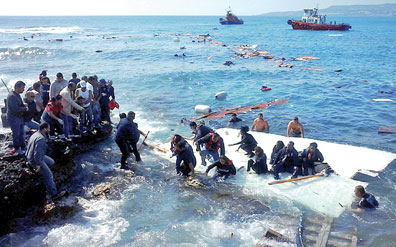How Australia's migrant policy works
Tony Abbott
claims Europe should copy his controversial "turn back the boats policy"
and it is timely to review Australia's approach and whether it works and
where.
Tony Abbott's recent call for Europe to adopt Australia's own
hard-line "stop the boats" approach to asylum seekers crossing the
Mediterranean has come under heavy criticism.
 |
|
Illegal migrants running
aground on Zefyros beach on Rhodes Island |
Experts have warned the controversial Australian methods - which
include deploying the navy to tow back boats, setting up remote island
detention centres and even providing fresh lifeboats for the voyage back
to foreign water - are inhumane, unlawful and will certainly not work in
Europe.
But how exactly does Australia's approach work - and could it really
be replicated?
Since he came to power in September 2013, Abbott's measures have
effectively brought an end to the arrival of asylum seekers by boat,
after more than 20,000 arrived - or almost a boat a day - in 2013.
Refugees
This has meant, some people have languished in the centres for years,
while those recognised as refugees could be released into countries such
as Papua New Guinea, a poverty-stricken nation with high rates of
violence and disease, and Nauru, a tiny, isolated and effectively
bankrupt island.
Despite critics saying the measures are in breach of international
law, Abbott has insisted they are the most effective way to stop the
flow of boat arrivals and the people smuggling trade.
Like Europe, Australia has witnessed numerous tragedies in which
rickety boats sunk while attempting the voyage, leaving hundreds of
asylum seekers dead.
Australia's tough response marks a vast shift from the 1970s, when
Canberra opened the doors to thousands of boat people fleeing the
Vietnam war and its aftermath.
Malcom Fraser, a former conservative prime minister, allowed 2,059
Indo-Chinese boat people to settle, along with more than 200,000
refugees whose claims were settled in Malaysia, Hong Kong and Thailand
from 1976 to 1982.
Fraser, who died last month, said the Abbott government's policies
were cruel and tyrannical and had "destroyed the rule of law as we know
it".
Most of the asylum seekers in recent years have come via Indonesia
from Iran, Iraq, Afghanistan and Sri Lanka.
International criticism
Critics say conditions in the offshore detention camps are inhumane
and that Australia's approach is inconsistent with international law and
with the country's obligations as a signatory to the United Nations 1951
Refugee Convention.
A UN report last month found that Australia's detention of children
and the indefinite holding of asylum seekers in harsh conditions on
Manus Island in Papua New Guinea was a violation of the international
convention against torture.
Alex Reilly, an expert on refugee law at the University of Adelaide,
said Australia's approach breached international laws against indefinite
detention and was probably also a violation of Australia's obligations
under the 1951 convention because it encouraged detainees to return home
and risk persecution.
"Keeping someone on an off-shores detention centre without any
prospect of release is indefinite detention," he told The Telegraph.
"The legality of Australia's approach is by no means certain and
clearly breaches rights under the International Covenant on Civil and
Political Rights. Some asylum seekers have voluntarily gone back but
that may be because conditions in offshore detention are so dreadful
that they are willing to go back and be persecuted at home."
But could it work here?
Responding to the capsizing of a boat off Libya which left some 800
people dead, Abbott extended his mantra to Europe, saying the "only way
you can stop the deaths is in fact to stop the boats."
"We must resolve to stop this terrible problem and the only way you
can stop the deaths is to stop the people smuggling trade," he said.
"That's why it is so urgent that the countries of Europe adopt very
strong policies that will end the people-smuggling trade across the
Mediterranean."
But some analysts have warned that Abbott's approach will not work in
Europe because Australia has the advantage of being geographically
isolated, so that forcefully deterring boat arrivals leaves them with no
alternative destinations.
"At one level the Australian policy has worked - it has been a great
disincentive to people to come because they know they won't be processed
in Australia," Associate Prof Reilly said.
"In the Mediterranean, if people can't make it to Italy, they may
attempt less safe passage to other countries. If people can't get to
Australia, they have nowhere else to go. The next place is New Zealand
which is untenable - it is so far away."
- The Telegraph |

